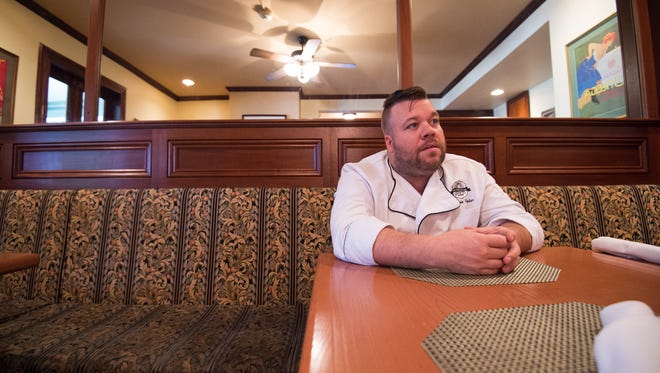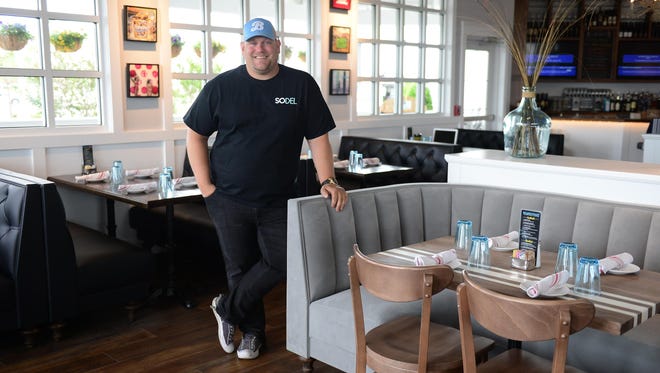Restaurant boom at Delaware beaches causing a labor shortage for some
 Jeff Neiburg
Jeff Neiburg
Wilson Gates remembers it well because it was only three or four years ago.
A Craigslist ad for an open position at The Gate House in Lewes would yield a response from about 15 people in 24 hours.
Now, the owner of The Buttery and an incoming sushi concept restaurant has ads out on Indeed, Monster, ZipRecruiter and Craigslist. Response has been slow, and with Memorial Day this weekend, time is of the essence.
Gates said the labor shortage is the worst he’s seen in his five years in town. The issue isn’t an uncommon one.
The restaurant boom at Delaware’s beach towns isn’t slowing, and even as the population in Sussex County grows, some restaurant owners like Gates are having problems filling open positions, especially in the kitchen.
"Finding quality back of the house staff is almost an impossible thing right now," Gates said.
It's not just a problem in Sussex County, it's nationwide. The National Restaurant Association reported in 2017 that 37 percent of its members identified labor recruitment as their biggest challenge, up 15 percent from 2015.
For Gates' sushi concept replacing The Gate House this summer, he said he had to search for talent out of state. The restaurant boom on Del. 1 alone has made working on Second Street in Lewes much less convenient.
The behemoths such as Crooked Hammock, Bluecoast, Big Chill and others have more than double the seats The Buttery does, meaning they need more kitchen staffers. Their locations allow for ample parking. And that parking is free, too.
It's a challenge, sure, but Gates said he's still quite happy. Even as the number of restaurants in Lewes has nearly doubled in 10 years, sales are still increasing at The Buttery and nightly head counts have never been higher. He has no problem, he says, making his bills in the offseason.
That's a testament, too, to the fact that being a restaurateur in Sussex County nowadays comes without much of an offseason.

'A numbers game'
Scott Kammerer, now the leader of SoDel Concepts, is entering his 25th season at the beaches.
He remembers the days of being able to find parking spots on Rehoboth Avenue year-round. Those days, finding talented restaurant employees was easy.
"It used to be in Rehoboth you could open a restaurant and open the back door two weeks before you open and there’d be 100 applicants," he said. "But those days are over. That no longer exists. So however you approach it, you have to approach it from a completely different mindset than even five years ago."
Kammerer's experience isn't quite the average these days. SoDel is unarguably the top dog when it comes to restaurants at the Delaware beaches. When it opened the 7,000-square-foot, 260-guest Bluecoast on Del. 1 last year, SoDel had 10 restaurants in its arsenal.
Along with La Vida Hospitality, Fins, Big Fish and other restaurant groups, Kammerer and the others are well positioned to attract and develop talent than the Gateses of the world with one or two restaurants.
Kammerer said it's harder for the smaller guys to compete because the bigger groups are able to provide a corporate experience. At SoDel's consulting wing, Haley/Kammerer, he usually advises smaller clients to double down on what they're good at and hire to weaknesses.
Kammerer calls the issues plaguing Sussex restaurants and their labor concerns a "perfect storm" of a squeeze. Immigration concerns, he thinks, could mean less J-1 foreign exchange visas than in previous summers. The sheer number of restaurants and the changing work habits of millennials isn't helping, either.
"It’s really a numbers game," Kammerer said.
A labor shortage, he says, means there's just not enough people "in the system."

The labor problem is mostly with kitchen staff. A lot of restaurant employees want to work shorter shifts under a little less pressure and make more money working a front-of-house position.
"A huge paradigm in this country needs to shift," says Hari Cameron chef and owner of a(MUSE) and grandpa (MAC).
Cameron wants line cooks, sous chefs and other kitchen workers to get more money and work fewer hours.
"It’s not an easy thing to have demands be put on you and it’s not an easy thing to cook," Cameron said.
"Unhappy employees don’t do great work."
The best way to combat the labor shortage and keep employees happy, Cameron says, is to pay them well, treat them well and train them in a way that allows you to retain as much staff as possible.
But that's not an easy task, so finding talent to keep the machine going in a state with a population under one million means recruiting out of state is almost a must.
"I look at it like I want us to compete with Charleston. I want us to compete with Savannah and Atlanta as dining destinations," Kammerer said. "And for that you need a tremendous amount of talent moving here from outside the area for the opportunity to work in these great restaurants."
The corporate structure of SoDel and others like it, though, means local development is a little easier. Kammerer said the company made the commitment about 10 years ago to try and develop employees and move them up through the system.
"You’re planting acorns and growing mighty oaks," he said.

Too many restaurants?
When Gates opens Bushi Sushi this summer, he won't be adding another restaurant to Lewes, he'll just be replacing one. And that's probably a good thing, considering all the options in the small town.
"Lewes is absolutely exploding right now," Gates said.
In the last year alone, The Wheelhouse, Big Oyster Brewery and The Station on Kings have opened.
"It’s like the golden age of restaurants at the beach, for the guests and for the people that work in restaurants," Kammerer said. "For the guests there’s an incredible number of choices and there’s all this talent and opportunities to go out to eat and it’s better than it’s ever been."
Cameron feels the same.
"In other parts of the country restaurants are closing at staggering rates. I don’t see that happening here," he said.

So when is the breaking point? When will the market be so saturated that there are too many restaurants? And where on earth will all those employees come from?
"I don’t think there’s a limit to how many restaurants and I also don’t think there’s a limit to how many people can move here," Kammerer said. "I think that we’ve only seen the tip of the iceberg in terms of people retiring and moving here from New York or New Jersey or Virginia.
"Every time there’s a construction boom they build more houses here. And then when there’s a slight recession, those people don’t leave. And then the next boom comes and it adds more people.
"The reality is things are changing and you either have to adapt or kind of get left behind."
DELAWARE BEACH NEWS
The man who turned The Starboard into a Dewey Beach powerhouse
Here's how to spot drowning this Memorial Day weekend
Memorial Day weekend at the beach: What you need to know

Contact reporter Jeff Neiburg at (302) 983-6772, jneiburg@delawareonline.com or on Twitter @Jeff_Neiburg.